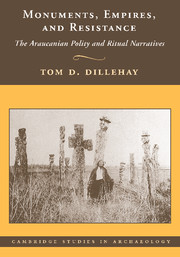Appendix One - Ethnographic Ritual Narratives at Hualonkokuel and Trentrenkuel
Published online by Cambridge University Press: 27 July 2009
Summary
The two narratives are structured differently with the Hualonkokuel dialogue presented in short separate verses, which reflect the ritual speaking style of machi Juanita, and with the Tren Trenkuel recording given in long continuous verses by machi Lucinda. Maria Catrileo transcribed both rituals from Mapundungun to Spanish. The Spanish in the Hualonkokuel was translated to English by Patricia Netherly; the Tren Trenkuel dialogue was translated to English by Ricardo Fernandéz. The author aided in the transcription of Mapundungun to Spanish and Spanish to English in both narratives. Only the Mapundungun and English versions are provided below. The selected English passages presented in Chapter 5 are numbered by verse segments in Roman numerals. Pauses in the machi's presentations are noted as pauses in the narratives. Also referenced are places where the tape recordings are illegible and where the transcribers could not understand the language. Words in brackets identify the subject of action or clarify the meaning of a behavior. Ritual audience refers to the local indigenous communities participating in ceremony. The Wenumapu and Nag Mapu are capitalized in the English translations, because they were given special voice inflexions in Mapundungun by the shamans. Finally, both machi often speak in the third person.
HUALONKOKUEL NARRATIVE
This narrative relates to healing ritual dialogues (llaimatun) and healing rites (dahatun) focusing on curing a sick kuel that threatens to harm the local community, because it is not giving him prayers and offerings. The machi has been summoned by the community to cure him.
- Type
- Chapter
- Information
- Monuments, Empires, and ResistanceThe Araucanian Polity and Ritual Narratives, pp. 411 - 464Publisher: Cambridge University PressPrint publication year: 2007

